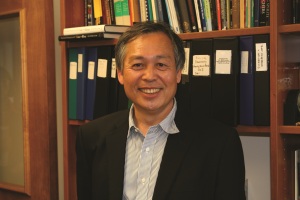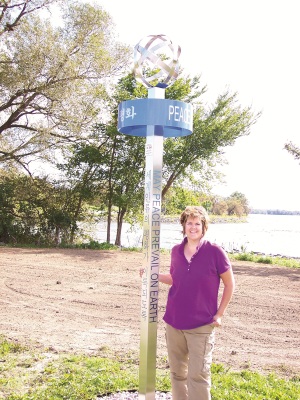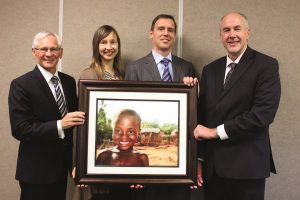Taiwanese Church Delegate Visits National Offices
 As part of his Canadian tour, the incoming general secretary of the Presbyterian Church in Taiwan visited national offices in September.
As part of his Canadian tour, the incoming general secretary of the Presbyterian Church in Taiwan visited national offices in September.
Rev. Lyim Hong – Tiong, who will be inducted as general secretary in April, saw the visit as an opportunity for mutual learning as both bodies seek church growth.
“The PCT promotes a holistic mission based on six dimensions: proclaiming the gospel, nurturing God’s children (with both mission and education), loving service, transformation of society, caring for God’s creation, and finally, culture and the gospel,” said Hong – Tiong.
He then pointed out the PCC’s role in bringing the gospel to an under – represented culture: the Hakka, an ethnic minority in Taiwan.
“It was [Rev. Dr.] Paul McLean of the PCC who translated the Hakka Bible.”
According to Hong – Tiong, more indigenous people are migrating to cities, creating opportunities for ministry. By their 150th anniversary in 2015, the PCT hopes to plant numerous churches in these communities.
While keen to discuss his church’s vision for the future, Hong – Tiong also wanted share some of the struggles the PCT faces.
“The Taiwanese are voiceless because they are under martial law. The church is the only one who can give voice to the [wider] ecumenical community,” he said.
Yet many outside Taiwan are uncertain about how to assist the country. After the Chinese Civil War ended in 1950, Nationalists who opposed Communism fled mainland China to Taiwan. The status of Taiwan has remained a point of debate. To avoid jeopardizing diplomatic relations with China, which claims control of Taiwan, many countries avoid officially recognizing Taiwan as an independent country.
Over the past 40 years, the PCT has not shied away from taking a political stance. The church has published multiple statements, appealing to the international community.
“We are asking the international community to respect Taiwan’s sovereignty. We should have the right to determine our future,” said Hong – Tiong. ¦ —Seth Veenstra
Peace Poles Boost City Morale

“It was really bringing down the morale of the city,” said Rev. Anne – Marie Jones, minister at St. Andrew’s.
Recognizing the brokenness in her community, Jones said she wanted to find a way for her church to reach out.
“I asked, how can we be the hand of Christ?” said Jones.
Then, while preparing for a Sunday school message, Jones encountered the story of Masahisa Goi and the peace pole.
In the wake of the bombings of Hiroshima and Nagaski, Masahisa Goi started a peace movement in Japan, rooted in the prayer, “May peace prevail on earth.” He began erecting physical representations of this prayer, with the words of the prayer inscribed on each of the four (or six) sides. The popularity of the idea has spread. Now there are more than 100,000 peace poles across the globe.
The story transformed Jones. “I call those moments a Holy Spirit experience: a thunderbolt,” said Jones.
After meeting with session, Jones and St. Andrew’s decided to develop a peace pole project.
In the past year, Jones and St. Andrew’s have purchased and dedicated two peace poles, planting them in public spaces.
The dedication services were well attended and included members of the press, civil servants, community members and Neal Ellis, the city’s mayor, who has since become a peace pole champion.
“The mayor is enthusiastic about the whole project,” said Larry Glover, Belleville’s manager of Parks and Open Space.
Community responses have also been encouraging. Jones said many people have told her they use the poles as destinations for prayer walks and times of meditation.
Recently, Jones, Glover and Ellis worked on a campaign that led to an exchange of peace poles with their twin city in Gunpo, South Korea.
“Now we want to take it a step further,” said Glover. “It’s our vision to have one peace poll every kilometre along our walking trail [by the Bay of Quinte].”
“We’ve gone through some tough times. It’s been great to put something positive out there. It’s a good news story.” ¦ —SV
Mother Pens Survival Guide for Parents of Bullied Children
Amanda was so severely bullied in school she developed post – traumatic stress disorder. She lost weight and became depressed, then suicidal. Her parents and teachers were at a loss. Eventually she dropped out: she needed to be in hospital.
Amanda’s story is also the story of how her mother, Laurie Flasko, navigated the worlds of health care institutions, school boards and support networks to find the proper help for her daughter. Ultimately, it is a story of a family’s return to wholeness.
Laurie details her family’s journey in Bullying is Not a Game: A Parent’s Survival Guide, a book she co – authored with Julie Christiansen. Laurie, who is also a member of Chippawa, Niagara Falls, hopes the resource will help educators and parents be more equipped than she was.
“We didn’t know what to do. No one knew,” said Laurie. “As Amanda got sick it permeated through our whole family and we all became sick, too.
“I kept pushing Amanda to go back to school,” said Laurie, remembering how hard it was to get her out of bed in the morning. “Now I realize that was a mistake. I mean, you don’t send abused women back to their husbands, right? You protect them. You find them shelter.”
Laurie believes Amanda’s school also mishandled the situation: “Their response was to put Amanda in a room with the 12 girls who were bullying her, tell them they had an hour to work it out on their own, then leave the room.”
These were the same girls, said Laurie, who created a website targeting Amanda, who left blood on her locker door, who told her she’d die if she ever came back to school.
In the end, Amanda did get the help she needed. The hospital was a safe environment. She found healing in art therapy. She began to work toward a general education diploma at her own pace.
The Flasko’s church, Chippawa, also gave the family the support they needed.
“When Amanda didn’t have friends at school, she had friends at church. When she became sick they came and laid hands on her,” said Laurie.
When Amanda’s pain began to affect the marriage of Laurie and her husband, the pastor and his wife walked alongside them and encouraged them to see a Christian counsellor.
As Amanda moved closer to recovery, Laurie started thinking about all the other parents whose children are bullied.
“I wanted to share my story.”
After Amanda was discharged from the hospital and started studying at Brock University, Laurie began pulling together material.
She talked to regional police, a faith-based crime and justice group, the local school board and a distress centre. A York University professor and expert on bullying gave her access to her files. Laurie also looked to more personal sources: church members, Amanda’s art therapist and Amanda herself; Laurie includes letters she and Amanda exchanged and even some of Amanda’s journal entries.
When asked how Amanda feels about her story being published, Laurie responded: “Once I finished, I didn’t want to release it. I had a moment of panic. But then Amanda said, ‘Mom, you have to.’
“She’s gone through the trauma. I’m still dealing with it.” ¦ —SV
New Agreement Sends Students to Ghana

Through the internship program, students from the Christian college in Ancaster, Ont., will be working in the city of Asamankese, about 80 km northwest of Accra.
“The goal is to provide undergraduates with international exposure to broaden their horizons and give them a world perspective on their education and faith,” said Rev. Dr. Rick Fee, general secretary of the church’s Life and Mission Agency. “It will also foster relations between a new generation of young Canadians and newfound friends from Ghana.”
In August the first intern, Angie Lang, began working with His Majesty’s School, a Christian facility in a predominantly Presbyterian area.
Ghana is a majority Christian country, with 18.6 per cent of its 24 million inhabitants subscribing to a form of Protestantism. The Presbyterian Church of Ghana has about 570,000 members and the Evangelical Presbyterian Church has about 200,000 according to the World Council of Churches.
In previous years, Redeemer University College has organized internships in various development programs in Asamankese. ¦ —Connie Wardle
